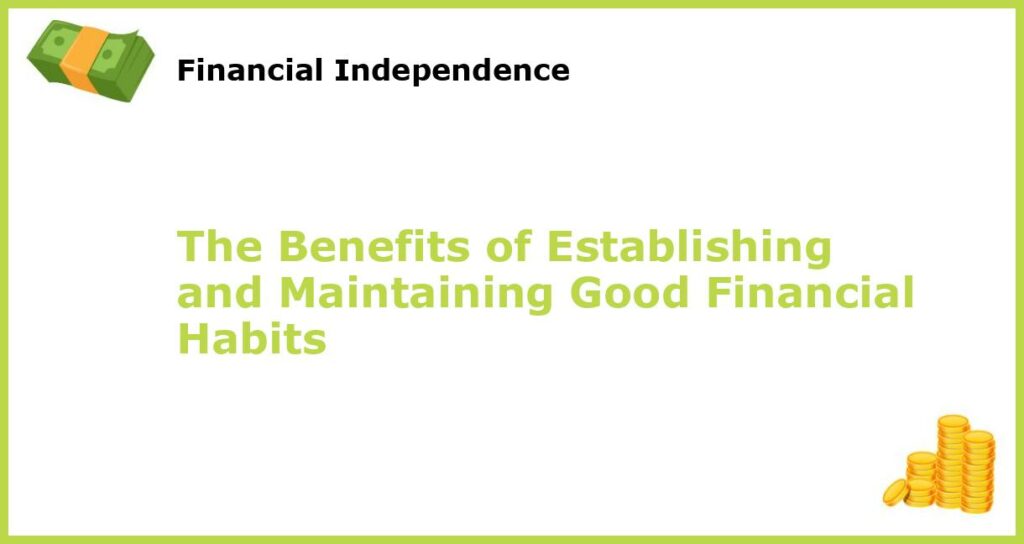Money makes the world go round – this is a phrase that we often hear. Finances undoubtedly play an essential role in our lives, and here’s why establishing and maintaining good financial habits is highly beneficial.
1. Better Financial Security

Financial security is a state in which an individual has enough savings and investments to cover some specific financial obligations in the future. Establishing and maintaining good financial habits can lead to financial security. In other words, by budgeting effectively, avoiding debt and making thoughtful investment decisions, individuals can be in a better position to save enough money for emergencies or be able to retire comfortably. Credible financial habits also ensure that an individual’s financial freedom is not limited.
2. Improved Credit Scores

Maintaining credible financial habits can lead to a vast array of opportunities, including improved credit scores. An individual with a high credit score stands a better chance of qualifying for better loan terms, low-interest rates, and job stability. As discussed, many employers, and landlords now check credit scores, and having a high credit score increases your chances of securing a job or rent an apartment becoming much easier.
3. Reduced Financial Stress

Living paycheck to paycheck and worrying about pending bills can lead to the accumulation of stress over time. Establishing good financial habits can, therefore, reduce financial stress levels and improve individuals’ overall well-being. Reduced financial stress lowers tension between partners and, in turn, positively impacts relationships.
4. Increased Financial Freedom

Establishing and maintaining good financial habits means individuals can make more choices on how to use their money. These choices may include saving up for a down payment on a home, taking a sabbatical from work, or pursuing passion projects. The feeling of financial freedom is fulfilling and brings about a sense of achievement.
5. Improved Financial Literacy

Financial literacy refers to the knowledge and skills necessary to make informed financial decisions successfully. Establishing and maintaining good financial habits improve an individual’s financial literacy skills. Learning about personal finance topics such as budgeting, investing, and credit management equips individuals with the necessary skills to make brilliant financial judgements. Financial literacy can also prevent individuals from making financial mistakes and enable them to take financial advantage opportunities.
6. Encourages Savings

Establishing good financial habits encourage saving, regardless of how little an individual is earning. Consistent savings over time surpass the initial amount saved and effectively accumulate over time, resulting in substantial savings. These savings offer a sense of security for emergencies and retirement, and more financial options in the future.
7. Builds Discipline

Establishing good financial habits requires discipline and self-control over spending. The practice of cultivating these attributes can positively impact other aspects of life, such as health, work, and relationships. Discipline with money can also lead to creating positive habits that impact other areas such as reading, exercising, or studying.
8. Helps You Achieve Financial Goals

Setting financial goals is essential to achieving financial success. Good financial habits such as budgeting, avoiding debt, and consistently saving for investment opportunities put individuals in a better position to achieve their financial goals. Breaking down financial goals into simpler and measurable objectives ensure that people can achieve them by following a specific plan.
9. Protects Against Financial Emergencies

No one knows when an emergency may strike and individuals need to be financially prepared for such occurrences. Maintaining good financial habits reduces the impact of such emergencies since an individual is adequately prepared to handle any financial issues arising. Being able to manage financial emergencies with minimal backlash positively impacts overall financial health.
10. Enhances Confidence

Establishing and maintaining good financial habits enhance an individual’s overall confidence and sense of empowerment. A person with credible financial control feels more confident in understanding how to handle any financial situation that arises positively. Financial stability leads to increased self-esteem, and greater feelings of confidence, security, and stability result from it.







